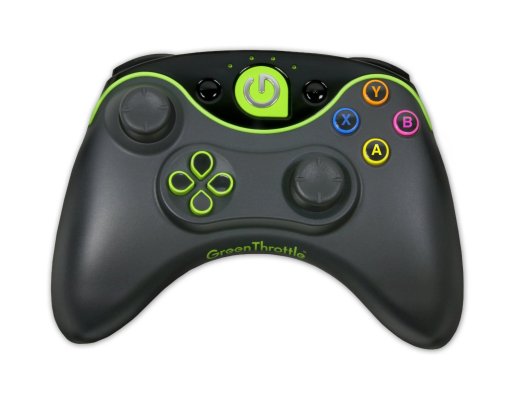Google has acquired Green Throttle Games – or at least what was left of the company after it essentially shut down late last year, according to a new report by PandoDaily. The startup followed Ouya, GameStick and others in providing an Android-based gaming experience designed for the living room, but it also had considerable talent thanks to founder Charles Huang, who created Guitar Hero, and differentiated itself through its Atlas controller, which is still available to buy online.
The Atlas is a Bluetooth controller that worked with the company’s Arena software to provide support for multiple controller input on the same device, meaning you could connect up to four players locally on a single Android smartphone or tablet connected to a TV, which isn’t normally possible. Plus, Arena provides a TV- and controller-input friendly interface for living room gaming. One last point that Green Throttle Games thought would be a differentiator: They offered an SDK to help developers build experiences specifically for the Atlas and living room play, instead of just converting mobile games with minor tweaks.
Overall the idea didn’t fare all that well, likely due to the amount of buy-in and effort required by developers, who had to offer multi-controller support in each app they created, since it’s a protocol that isn’t standard on Android. Which might be part of the reason Google was interested in acquiring them.
The Atlas is still available on Amazon, but the Arena died late last year, so it’s effectively just another Bluetooth gaming controller at this point. Google acquiring their assets and talent provide some hardware smarts to the search giant, and Pando suggests that Google could be gearing up to release a set-top box as previously rumored, possibly for release early this year. Green Throttle could definitely help with the gaming side of such an endeavor, but the underlying Bluetooth protocol has broader application possibilities, and there’s the Chromecast to consider, too.
Google already has an in-road to consumer TVs, and that’s a prime opportunity to introduce two-screen gaming features. Apple already encourages this on Apple TV with its Airplay streaming tech for iOS devices, and Google’s Chromecast SDK opens up more similar opportunities for Android software. But adding four-player local support natively to Android’s Bluetooth protocols would be a considerable gaming advantage, especially as mobile continues to challenge consoles for gaming supremacy. And were it built-in at system level to Android software, it wouldn’t require new hardware to make its way out to the user community.
Android home gaming may still be largely a case of square peg, round hole (as demonstrated by the GamePop I reviewed yesterday, as well as the failure of Ouya and others), but Google adding more system level support and taking the best part of multiple approaches could change that for the better.
